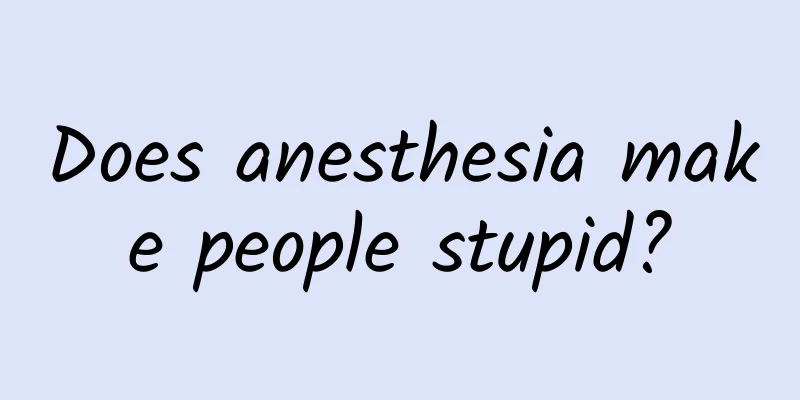Does anesthesia make people stupid?

|
Does anesthesia make people stupid? Anesthesia is an indispensable part of modern medicine. It allows patients to feel no pain during surgery or certain medical procedures. However, many patients who receive general anesthesia often have a common concern, which is "Will anesthesia make people stupid?" Now, let's talk about anesthesia and intelligence. Anesthesia refers to the use of drugs or other methods to temporarily make the patient lose all or part of their sensation in order to achieve painless surgery or other medical procedures. It is divided into general anesthesia, spinal anesthesia, and nerve block anesthesia. General anesthesia: Anesthetic drugs are injected into the body through intravenous injection, inhalation, etc., causing the patient to completely lose consciousness, eliminate pain throughout the body, and enter a sleep-like state to meet the needs of large or complex operations. Spinal anesthesia: including subarachnoid anesthesia and epidural anesthesia, mainly used for lower abdominal, lower limb and perineal surgeries. Anesthetic drugs are injected into the corresponding spaces in the spinal canal to block the transmission of nerve signals and produce anesthesia in specific areas of the body. The patient may remain awake or in a state of mild sedation. Nerve block anesthesia: It can be used for limb surgery, etc. to temporarily block nerve conduction in that area, producing a local painless effect. The patient usually remains awake during the operation. People usually say that intelligence is determined by the brain, but the human body has a blood-brain barrier, and general drugs will not act directly on the brain. When anesthetics work, they mainly temporarily inhibit the function of the central nervous system, allowing the human body to complete the operation without pain and consciousness. When anesthetics are metabolized and excreted, their inhibitory effect on the central nervous system will disappear. Of course, some patients just feel that their minds are blank during the surgical anesthesia. Many times, some patients even feel that they have not had surgery at all. This is because of the amnesia effect of anesthetics, not because of a general anesthesia that leads to memory loss. Don't worry too much. Of course, the effects of anesthesia may require more attention for special populations such as children and the elderly. Some studies have pointed out that repeated general anesthesia at a very early age (such as in infants) may have an impact on long-term cognitive development, but these conclusions need more research to verify. Due to the decline in physiological function, the elderly have a reduced ability to metabolize and excrete anesthetic drugs, especially those who already have mild cognitive impairment. Surgery and anesthesia may accelerate cognitive decline, but this association is not absolute, and each patient's situation is different. However, a small number of people will experience cognitive changes after general anesthesia, such as nonsense or even mental abnormalities. This situation is medically called perioperative neurocognitive dysfunction (POCD). POCD is one of the complications of general anesthesia, but it will not cause permanent damage to the brain. Domestic and foreign studies have shown that this change in postoperative cognitive function is usually short-lived and reversible, and even for the elderly, they will not remain "stupid" forever. Generally speaking, the older you are, the more likely you are to develop POCD. In addition, cardiovascular and cerebrovascular diseases, alcoholism, surgical trauma, etc. are also high-risk factors. Don't equate "the possibility of POCD" with "people will become stupid after general anesthesia." Authoritative guidelines clearly state: American Society of Anesthesiologists (ASA): "There is no conclusive evidence that modern anesthesia causes permanent cognitive impairment" (2024 Guidelines). European Society of Anesthesiology (ESA): "The risk of neurotoxicity from a single general anesthesia is lower than the annual rate of cognitive decline with natural aging (approximately 0.5-1%/year)" The American Society of Anesthesiologists (ASA) clearly stated that there is no evidence of long-term brain damage in adults and children from a single standardized anesthesia. Anesthesia is the "safety guardian" of modern medicine. Its short-term cognitive effects can be avoided through scientific management. Patients do not need to give up eating because of fear and delay treatment. (Tian Lei, Anesthesiology Department, Yangxin County People's Hospital) |
<<: High incidence season! Fuzhou Disease Control (Health Supervision) important reminder!
Recommend
If a woman's area turns black, her husband will definitely hate it
The weather is hot in summer, and the skin is pro...
I have lower abdominal pain for a few days and I haven't had my period.
Female friends should know that most women will e...
What to eat when constipated after giving birth
Many pregnant women who have just given birth wil...
Expelling the gestational sac 10 days after medical abortion
As we all know, when a woman is pregnant, the fir...
Ovarian solid echo
Solid ovarian echoes indicate that lesions may ha...
What should we pay attention to if the follicles do not develop well?
The most important thing for women is the functio...
Pictures of incisions for cesarean section of second child
Having a second child is a trend in today's s...
Treatment of multiple breast cysts
Breast disease is a common disease in daily life,...
Woman was betrayed because of 4 little moves in bed
Today, let’s take a look at women’s different wak...
What are the medicinal uses of cockscomb? What are the benefits of drinking cockscomb water to the body?
Cockscomb is very common in life. It is deeply lo...
What food is good to eat during confinement?
Confinement has always been regarded by women as ...
There are many types of B vitamins, each with different functions. The pharmacist tells you the difference.
A friend asked Huazi a question, why is there onl...
How to treat papillitis?
There are many types of nipple diseases, all of w...
Can I get pregnant if my endometrium is 0.8 thick?
Pregnancy is the most important part of a woman&#...
What are the treatments for poor follicular development?
The development of follicles is the key to whethe...









